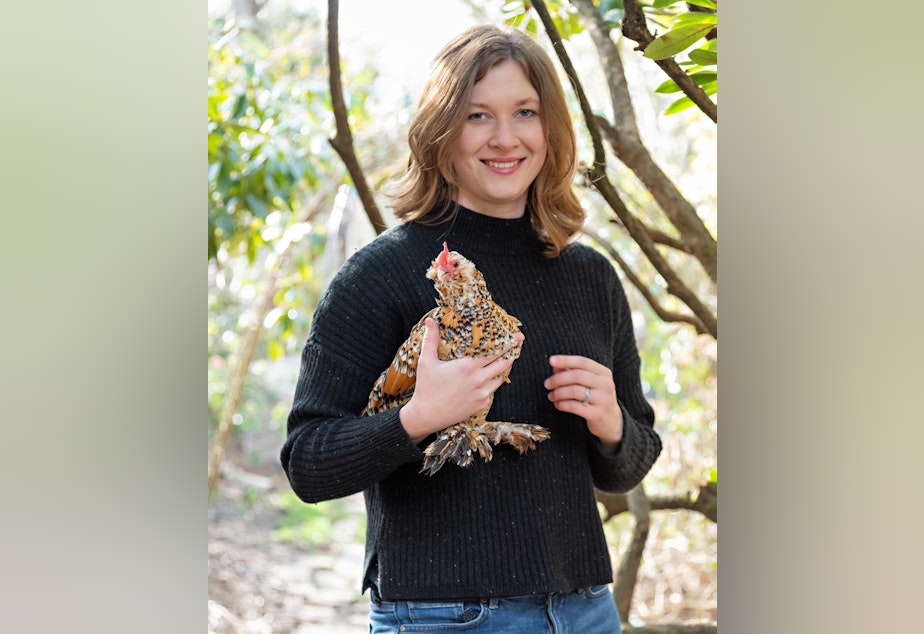Why more city dwellers are falling 'Under the Henfluence' of backyard chicken coops

In Seattle, it’s legal to own up to eight chickens or “domestic fowl” per city lot. That can mean fresh eggs or meat from a source you know is local and well cared for.
But it can also mean eight clucking and fussing birds living in a coop, on a small patch of lawn in a busy neighborhood.
It may be hard to get the neighbors on board with backyard chickens, even though Seattle is a hen-only zone. Roosters are outlawed in the city.
But Tove Danovich says that caring for your own flock is worth the trouble.
Danovich is the author of “Under the Henfluence: Inside the World of Backyard Chickens and the People Who Love Them.” She also has her own little family of Instagram-famous birds.
Her flock began a few years ago, after she moved to Portland with her husband. It began as an ethical source for eggs and meat. But as Danovich came to know the chickens, she grew more attached.
That led her on a journey to learn more about the birds, and the ethics of backyard chicken ownership.
Sponsored
For Danovich, owning chickens runs in the family. Her great grandmother had a flock of chickens, like many farm women living in North Dakota.
"She raised them for what was known as egg money," she said. "And egg money was how all of the household expenses were paid for and women's expenses too. And when you hear that you usually think, 'Oh, it's getting your hair done. It's like clothes and makeup.' But it was food, it was school bucks, it was all of your clothing. And it was so important to the household income."
In decades past, owning backyard chickens would probably generate strange looks. But that's not Danovich's experience these days.
"Now when I tell people I have pet chickens, they're like, 'Oh yeah, my friend has pet chickens, my mom has pet chickens...let me tell you about everyone else I know and their pet chickens,'" she said.
According to Danovich, the urban chicken boom can be traced back to circa 2005.
Sponsored
"That's when we started having this 'Know Your Farmer, Know Your Food' thing happening," Danovich said, adding that the movement inspired her to get chickens.
"A lot of people just wanted to have food that they grew — they knew where it came from, they knew that it was raised without pesticides if it was a crop, or raised humanely if it was an animal. And so it really started picking up steam and more cities started legalizing keeping backyard chickens, which had not been possible to do in a number of areas until recently. And they are still new places all the time that are allowing chickens that hadn't before."
In addition to learning about the food-producing aspects of chickens, Danovich said she's learned a lot about the birds' emotional lives.
"I've definitely anecdotally heard stories from people who were down to the last chicken and even if they maybe didn't pass on from loneliness, they grieve — they definitely have relationships with each other," she said. "They're flock animals; there's a reason why people recommend you never have just one chicken. I say never fewer than three because there is always the possibility that something happens to them. And you don't want to be scrambling to find a chicken and in the middle of winter to give yours a friend."
Along with the friendships that can exist among chickens, some are prone to tussling.
Sponsored
"The term the 'pecking order' comes from chickens, which refers to the fact that they have a social hierarchy and work in groups...and all of these social systems," Danovich said. "And yet it's very surprising to people that they have relationships...that they have some chickens they like a lot for some reason, and others, they don't like the way that they looked at them and now they're fighting."
Danovich will be speaking Thursday, April 27 at 7 p.m. at Third Place Books in Lake Forest Park. You can find more information about that event, and how to get tickets, here.
Listen to the full conversation with Danovich by clicking the "play" button above.






